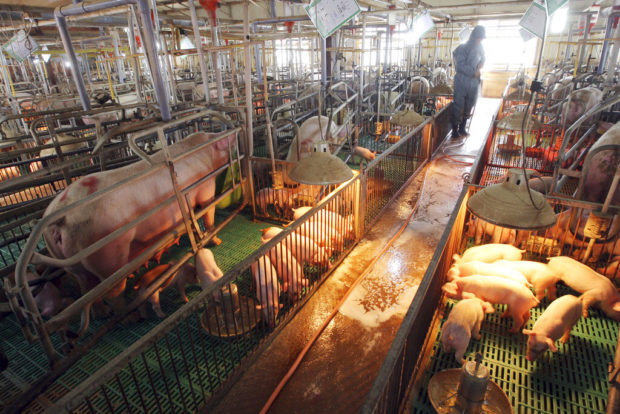New swine flu found in China has pandemic potential

In this file photo taken on April 29, 2009, a South Korean farmer sprays disinfectant against a possible swine flu outbreak at a port farm in Paju, South Korea. (AP Photo/Yonhap, Lee Jung-hoon, File)
WASHINGTON, United States — Researchers in China have discovered a new type of swine flu that is capable of triggering a pandemic, according to a study published Monday in the US science journal PNAS.
Named G4, it is genetically descended from the H1N1 strain that caused a pandemic in 2009.
It possesses “all the essential hallmarks of being highly adapted to infect humans,” say the authors, scientists at Chinese universities and China’s Center for Disease Control and Prevention.
From 2011 to 2018, researchers took 30,000 nasal swabs from pigs in slaughterhouses in 10 Chinese provinces and in a veterinary hospital, allowing them to isolate 179 swine flu viruses.
The majority were of a new kind which has been dominant among pigs since 2016.
Article continues after this advertisementThe researchers then carried out various experiments including on ferrets, which are widely used in flu studies because they experience similar symptoms to humans — principally fever, coughing and sneezing.
Article continues after this advertisementG4 was observed to be highly infectious, replicating in human cells and causing more serious symptoms in ferrets than other viruses.
Tests also showed that any immunity humans gain from exposure to seasonal flu does not provide protection from G4.
According to blood tests which showed up antibodies created by exposure to the virus, 10.4 percent of swine workers had already been infected.
The tests showed that as many as 4.4 percent of the general population also appeared to have been exposed.
The virus has therefore already passed from animals to humans but there is no evidence yet that it can be passed from human to human — the scientists’ main worry.
“It is of concern that human infection of G4 virus will further human adaptation and increase the risk of a human pandemic,” the researchers wrote.
The authors called for urgent measures to monitor people working with pigs.
“The work comes as a salutary reminder that we are constantly at risk of new emergence of zoonotic pathogens and that farmed animals, with which humans have greater contact than with wildlife, may act as the source for important pandemic viruses,” said James Wood, head of the department of veterinary medicine at Cambridge University.
A zoonotic infection is caused by a pathogen that has jumped from a non-human animal into a human.